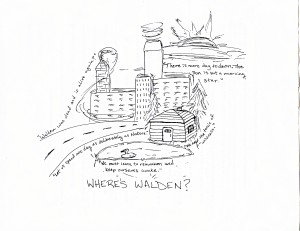
Day to day I am faced with the dilemma of how to communicate the necessity and immediacy of the accelerating climate disaster and the ongoing environmental degradation.
Do I tell you to take off your shoes, burrow your toes, your fingers, your nose into the dirt, and relish the smell and feel of the earth as you did as an exploring, inquisitive child? Nature’s wonders evoke indescribable awe, and this is true for both its beauty and destructive power.
Do I ask you who is responsible for the flooding and unprecedented number and extremity of natural disasters that have led to the destruction of homes and displacement of peoples across the globe?
Confronted by so many avenues and moving reasons to dedicate ourselves to sweeping structural change, I find I turn to the insightful writing of famed American naturalist and author of Walden, Henry David Thoreau. He would suggest I look inward, into the hearts and minds of Americans, before seeking substantive change towards forward-thinking societal structures.
Thoreau’s suggestions to simplify and humble ourselves are fundamental to framing our responsibility to the environment. What would Thoreau make of our society of consumers so focused on the fleeting fulfillment that comes from ownership? What of the diminished value of independent creation and unfiltered experience? What would he think of our fixation on timeliness, that every lost minute costs us money? I think Thoreau would be overwhelmed by our neuroses and profoundly disappointed in our complacency and passivity.
In Walden, Thoreau criticizes ownership as artificial and appealing to the ego. This is especially true when one has the ability to enjoy life and nature free of ego without domination but instead relaxing into nature’s rhythm. If Thoreau emphasizes embracing experience without ownership to live more authentically, how are we supposed to do so in a world where people are defined by their consumptive choices?
Popular trends, current styles, coveted brand names, overt and subtle messages from the media and society, and sourcing considerations define even the simplest consumer decisions we make — clothing ourselves.
I think Thoreau would suggest simpler considerations of the practicality of clothing, such as warmth and functionality, in order to reserve greater time, thought, and reflection for the way in which we live.
Thoreau deeply believed that we must “simplify, simplify, simplify!” Only in slowing down, cutting back, and opening up to the world are we able to delve into the depth of perception, introspection, and creativity. Unfortunately, I can’t say I adhere to Thoreau’s directive anymore than any other over-involved Gustie, too eager to experience and immerse myself in all the opportunities that are offered to me.
How can you or I honor Thoreau’s vision and close relationship to nature and its rhythm when we are so closely managed by meetings, deadlines, and schedules? How can we speak out against impending climate disaster when we can barely keep our own lives from spinning away from us with a direction and velocity entirely their own?
Knowing the devastating effects of climate change that are already unfolding on a global scale should be enough to make us finally take this issue seriously. It has taken us far too long to remember that our health and wellbeing relies on the care and stewardship we practice in our environment.
Finally, and most importantly, I believe that Thoreau would not despair, but encourage us to take heart in the possibility of our own creativity and ingenuity. He writes, “We must learn to reawaken and keep ourselves awake.”
Renewal of spirit and purpose is essential to maintaining our conviction and vitality in this endeavor. Slow your walk, your speech, your rushing, tumbling thoughts. Take a deep breath of air, slowly . . . slowly . . . and again, slowly . . . let it out.